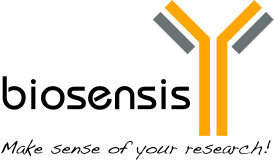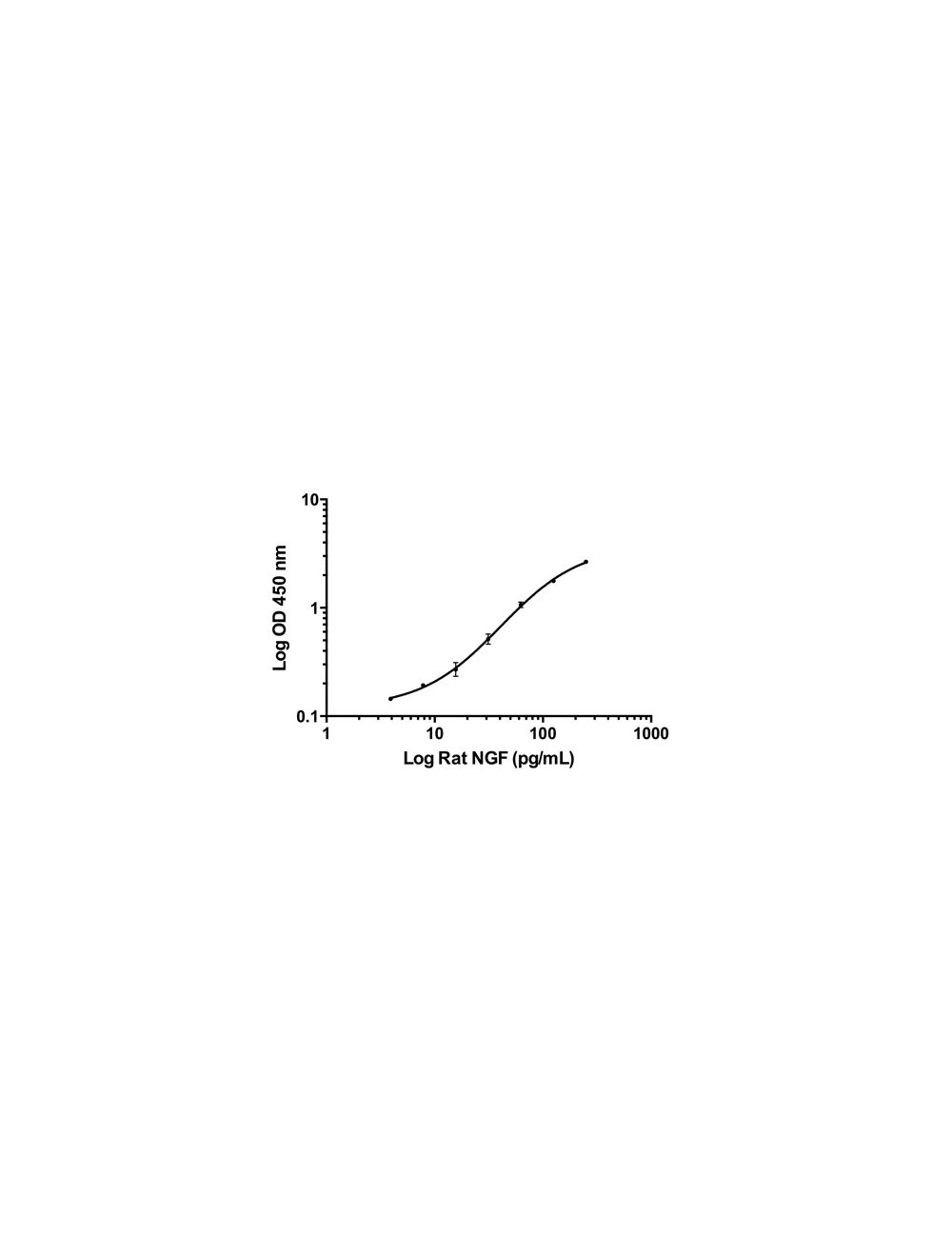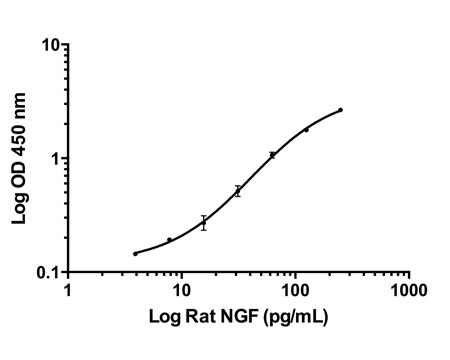Nerve growth factor (Beta-NGF), Rat, Guinea Pig, Rapid™ ELISA assay
- Product Name Nerve growth factor (Beta-NGF), Rat, Guinea Pig, Rapid™ ELISA assay
-
Product Description
The Biosensis NGF RapidTM enzyme-linked immunosorbent assay (ELISA) Kit is a sandwich ELISA that allows the quantification of rat NGF in less than 3 hours in cell culture supernatants, serum, and brain extracts only if used as directed. Please refer to the kit protocol for specific use instructions for each substrate application, in particular serum samples.
This ELISA kit consists of a pre-coated mouse monoclonal anti-NGF capture antibody, a biotinylated anti-NGF detection antibody and horseradish peroxidase (HRP)-conjugated streptavidin. The addition of a substrate (3,3',5,5'-tetramethylbenzidine, TMB) yields a colored reaction product which is directly proportional to the concentration of NGF present in samples and protein standards.
This NGF ELISA kit is designed to measure rat NGF and thus employs a recombinant rat NGF protein. Due to a high degree of NGF sequence homology, the antibodies used in this kit will also detect NGF from other species including human and mouse! Guinea pig NGF has been quantified in serum using this ELISA kit using rat NGF protein as calibrator, as it shows largest sequence homology based on amino acid sequence among rodent and human NGF proteins.
The assay antibodies preferentially detect the mature form of NGF, as shown by data comparing mature mouse NGF and mouse proNGF in the Mouse NGF ELISA kit (BEK-2213). Cross-reaction of full-length proNGF was < 0.1% when assayed at 25 ng/mL in assay buffer, and not detectable when assayed across the mature NGF calibration range.
This kit has not been tested for other applications. It has been configured for research use only and is not to be used in diagnostic or clinical procedures. - Alternative Names Beta-nerve growth factor; Ngfb; NGF;
- Application(s) ELISA
- Species Reactivity Guinea Pig, Rat
- Immunogen Description Sf 21 (baculovirus)-derived rat beta-NGF protein
- Range 3.9 - 250 pg/mL
- Sensitivity Typical limit of detection (LOD) for rat NGF is 2 pg/mL determined as 150% of the blank value.
- Regulatory Status For research use only.
Product Info
-
Product Description
The Biosensis NGF RapidTM enzyme-linked immunosorbent assay (ELISA) Kit is a sandwich ELISA that allows the quantification of rat NGF in less than 3 hours in cell culture supernatants, serum, and brain extracts only if used as directed. Please refer to the kit protocol for specific use instructions for each substrate application, in particular serum samples.
This ELISA kit consists of a pre-coated mouse monoclonal anti-NGF capture antibody, a biotinylated anti-NGF detection antibody and horseradish peroxidase (HRP)-conjugated streptavidin. The addition of a substrate (3,3',5,5'-tetramethylbenzidine, TMB) yields a colored reaction product which is directly proportional to the concentration of NGF present in samples and protein standards.
This NGF ELISA kit is designed to measure rat NGF and thus employs a recombinant rat NGF protein. Due to a high degree of NGF sequence homology, the antibodies used in this kit will also detect NGF from other species including human and mouse! Guinea pig NGF has been quantified in serum using this ELISA kit using rat NGF protein as calibrator, as it shows largest sequence homology based on amino acid sequence among rodent and human NGF proteins.
The assay antibodies preferentially detect the mature form of NGF, as shown by data comparing mature mouse NGF and mouse proNGF in the Mouse NGF ELISA kit (BEK-2213). Cross-reaction of full-length proNGF was < 0.1% when assayed at 25 ng/mL in assay buffer, and not detectable when assayed across the mature NGF calibration range.
This kit has not been tested for other applications. It has been configured for research use only and is not to be used in diagnostic or clinical procedures. -
Related Products
Nerve growth factor, pro- (proNGF), Mouse, Rat, Rapid™ ELISA assay
Mature NGF/proNGF Combo (BEK-2214/2236), Rat, Rapid™ ELISA assay
- Application(s) ELISA
- Application Details ELISA. For the quantification of Nerve growth factor (Beta-NGF) in Culture Supernatant, Serum, Tissue Homogenates. Please download the detailed product insert for complete instructions for the successful use of this ELISA. Use only as directed.
- Target Nerve growth factor (Beta-NGF)
-
Target Cross-Reactivity (ELISA)
The antibodies used in this ELISA kit bind epitopes within the mature domain of the protein. No cross-reactivity was observed with brain derived neurotrophic factor (BDNF), neurotrophin-3 (NT-3), NT-4/5 and proNGF protein tested at 25 ng/mL in assay buffer. Due to a high degree of NGF sequence homology, the antibodies used in this kit will also detect NGF from other species including human and mouse!
Mature NGF (27 kDa) and full-length proNGF (50 kDa) were assayed in parallel at equimolar protein concentrations across the NGF ELISA calibration range (3.9-250 pg/mL; 0.14-9.2 pmol/L). OD readings for proNGF were indistinguishable from the assay's blank OD readings. Data was obtained with the Mouse NGF ELISA kit (BEK-2213) which uses the same assay capture and detection antibodies - Target Host Species Rat
- Species Reactivity Guinea Pig, Rat
- Immunogen Description Sf 21 (baculovirus)-derived rat beta-NGF protein
- Range 3.9 - 250 pg/mL
- Sensitivity Typical limit of detection (LOD) for rat NGF is 2 pg/mL determined as 150% of the blank value.
- Sample Type Culture Supernatant, Serum, Tissue Homogenates
- Detection Method Colorimetric
- Kit Components The ELISA kit box contains 96-well pre-coated strip plate(s), protein standards, detection reagents, wash and sample buffers, substrate buffer and detailed protocols.
- Storage Instructions Store at 2-8°C
- Storage Temperature 2-8°C
- Batch Number Please see item label.
- Expiration Date 12 months from purchase.
- Alternative Names Beta-nerve growth factor; Ngfb; NGF;
- Uniprot Number P25427
- Uniprot Number/Name P25427 (NGF_RAT)
- Scientific Background FUNCTION: Nerve growth factor is important for the development and maintenance of the sympathetic and sensory nervous systems. It stimulates division and differentiation of sympathetic and embryonic sensory neurons. SUBUNIT: Homodimer, associated by non-covalent forces. SUBCELLULAR LOCATION: Secreted protein. SIMILARITY: Belongs to the NGF-beta family.
- Shipping Statement For order quantities larger than 1 plate, this product is supplied in package units of 2 plates.
- Shipping Temperature 2-8°C (on cold packs)
- UNSPSC CODE 41116158
- Regulatory Status For research use only.
Specifications
-
Specific References
Su X et al. (2023) Decellularized extracellular matrix scaffold seeded with adipose-derived stem cells promotes neurorestoration and functional recovery after spinal cord injury through Wnt/ β-catenin signaling pathway regulation Biomed Mater. 19(1). Application: Rat, Tissue homogenate; Cell culture supernatant.
Sirmakesyan S et al. (2023) "Synthesis and secretion of Nerve Growth Factor is regulated by Nitric Oxide in bladder cells in vitro under a hyperglycemic environment" Nitric Oxide. [Epub ahead of print] Application: Rat cell lysates.
Székiová E et al. (2023) "Characterisation of mesenchymal stem cells conditioned media obtained at different conditioning times: their effect on glial cells in in vitro scratch model" Growth Factors. [Epub ahead of print] Application: Rat cell culture supernatant.
Mossa A et al. (2021) "Adaptation to partial urethral obstruction in healthy aging LOU rats and the role of nerve growth factor signaling pathway in the bladder." Exp Gerontol. [Epup ahead of print] Application: Rat urine.
Itai S et al. (2020) "Cell-encapsulated chitosan-collagen hydrogel hybrid nerve guidance conduit for peripheral nerve regeneration." Biomed Microdevices. 22(4):81 Application: Rat cell culture supernatant.
Cheppudira BP et al. (2016) "Anti-nerve growth factor antibody attenuates chronic morphine treatment-induced tolerance in the rat." BMC Anesthesiol. 16:73 Application: Acid-extracted rat spinal cord homogenate.

 1800 605-5127
1800 605-5127 +61 (0)8 8352 7711
+61 (0)8 8352 7711


